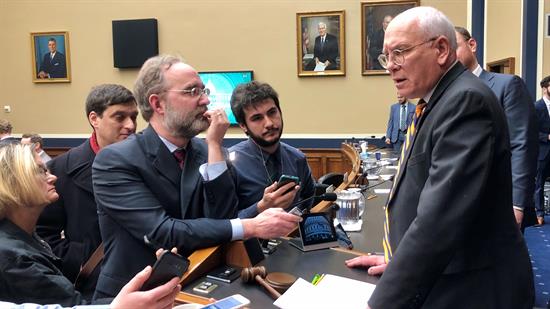- Home
- About
-
Constituent Services
- Academy Nominations
- Community Project Funding
- Congressional Art Competition
- Congressional App Challenge
- Congressional Commendation
- Event Invitation
- Grants
- Help with a Federal Agency
- Internships
- IRA Clean Energy Consumer Benefits
- Know Your Rights: Immigration
- Request a Meeting
- Request Surplus Books
- Presidential Greeting
- Visit Washington D.C.
- Issues & Legislation
- News
- 20th District
- Contact

Press Releases
Tonko, Schatz Introduce Carbon Dioxide Removal Research BillLegislation would empower U.S. to lead the world in CDR research & technology development
Washington,
September 14, 2023
WASHINGTON, DC — Congressman Paul D. Tonko (NY-20) and Senator Brian Schatz (HI) today introduced the Carbon Dioxide Removal Research and Development Act, legislation that responds to the realities of climate change and follows the recommendations of the scientific community to implement a federal plan to develop carbon dioxide removal (CDR) technologies. “Scientists have made it clear — we require a multi-pronged, innovative approach to meet our net-zero emissions goals,” Congressman Tonko said. “In a year of record-breaking heat, wildfires, and extreme weather events caused by climate change, reducing emissions has never been more critical. Our Carbon Dioxide Removal Research and Development Act enables our nation to meet our climate goals, responding to the call of scientists and helping our nation lead the world in innovative CDR development. We need this bill to set us on the path to boldly and fully respond to the climate crisis, and I urge my colleagues to join us in passing this bill without delay.” The Intergovernmental Panel on Climate Change (IPCC) stated in a recent report about the need for CDR as a fundamental aspect of climate action. Further a robust U.S. research initiative to advance CDR technologies has been recommended by the National Academies of Science, Engineering, and Medicine in 2018, the Energy Futures Initiative (EFI) in 2019, and the House Select Committee on the Climate Crisis in 2022. “Carbon dioxide removal from the atmosphere and upper oceans is receiving increasing interest as a means to complement, but not substitute for, decarbonization of the global economy,” said Ernest J. Moniz, CEO of the EFI Foundation and 13th U.S. Secretary of Energy. “It is absolutely essential to achieve net negative carbon emissions over the longer term. The EFI ‘Clearing the Air Report,’ as well as others, identified a broad research portfolio of potential CDR solutions. The proposed legislation could serve as the catalyst to accelerate the needed R&D efforts.” “Climate change demands a range of tools to reduce carbon dioxide in the atmosphere, including reducing emissions at the source. Carbon removal can be complementary to those efforts, especially around hard-to-tackle sectors in our economy, and we should support research efforts now,” said Elizabeth Gore, Senior Vice President for Political Affairs at the Environmental Defense Fund (EDF). “With this bill, Senator Schatz and Congressman Tonko are taking an important step toward strengthening our policy toolkit for a safer, net-zero future. EDF is committed to ensuring that climate change action broadly will make our families healthier, our air cleaner and our planet more livable.” “We need a portfolio of high-quality carbon removal solutions to reach global climate goals, and the Carbon Dioxide Removal Research and Development Act of 2023 introduced by Rep. Tonko today is an ambitious piece of legislation proportional to the task at hand” said Sasha Stashwick, Carbon180 Director of Policy. “If passed, it would significantly bolster federal investments in early-stage research and development, alongside demonstration and pilot-scale projects in this critical sector. Federal funding for these priorities is essential to our ability to reach the scale of carbon removal deployment needed, and to ensure the US continues to lead in this emerging climate solutions sector. This bill would also launch a whole-of-government approach to carbon removal, ensuring federal agencies are coordinated in this push to develop, collect data on, and monitor carbon removed and stored.” H.R. 5457, The Carbon Dioxide Removal Research and Development Act of 2023:
A bill fact sheet can be found HERE. A two-page bill summary can be found HERE. |
